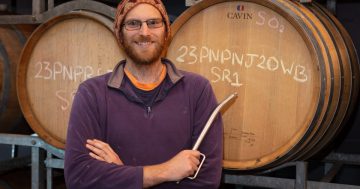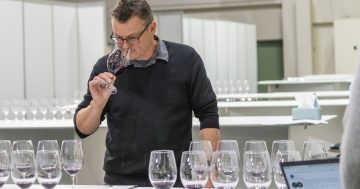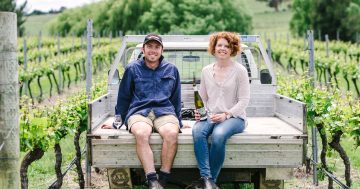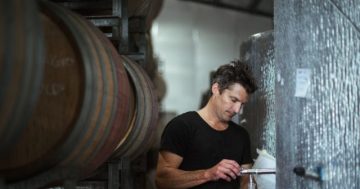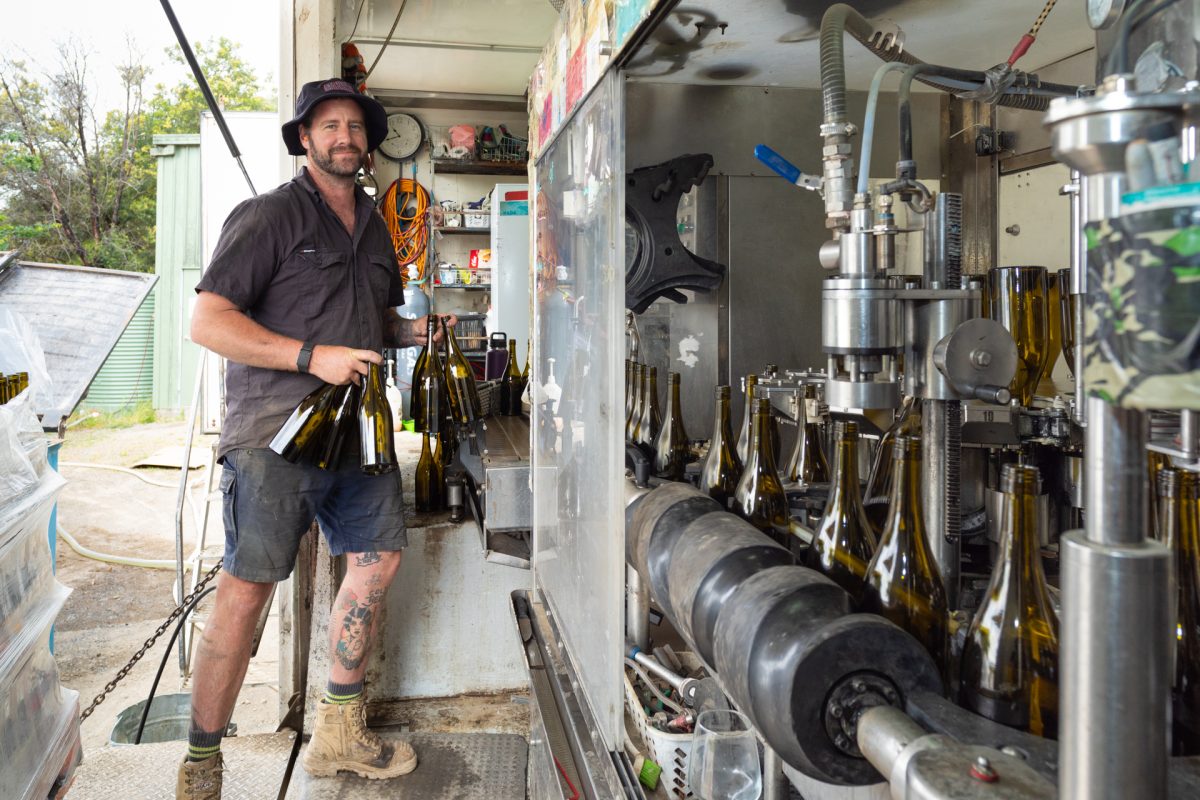
Nathan Profitt from mobile bottling service Vintage Bottlers on site at Lerida Estate. Photo: Michelle Kroll.
It takes a winemaker months, sometimes years of meticulous work, to perfect a vintage of their product, and if they’re not careful, it can all come crashing down in the last half hour of production: bottling.
Needless to say, it’s enough to send a shiver down the spine of Lerida Estate winemaker Jacob Law.
He says while some see the bottle as no more than a marketing opportunity and a good source of information for the consumer, winemakers know better than to underestimate this crucial part of the process.
“Bottling, for me, is probably the most nerve-wracking part of wine-making. A lot of people don’t realise it’s a key part of the process, yet with so many moving parts, there are many things that can go wrong,” he says.
“When you’ve poured your blood, sweat and tears into growing grapes and turning them into this beautiful product, you really don’t want to see that go down the drain at the very end.”
After the last steps of actually making the wine – blending and filtration – Jacob still has a good amount of work to prepare for bottling. This includes analysing the chemistry wine of the wine and testing pH levels, filterability and protein and cold stability to ensure it won’t form crystals and hazes once bottled.
Then, the fast-paced process of bottling and labelling begins, with numerous heart-stuttering pressure points. Much of it is done by hand. Oxygen and condensation are the enemy and, in Canberra, the climate that plays such an important role in producing Lerida’s unique profiles can seem downright hostile.
It’s not a process Jacob and the team can take on alone.
“It’s not viable for many Canberra producers to have their own wine bottling set-up. The machinery is expensive and requires a lot of expertise and maintenance,” he says.
Some small producers opt to send their product away in purpose-built tankers. Jacob prefers to have control over the process and the ability to conduct last-minute checks that he can only get from a mobile bottler coming onsite.
“If I were to truck it to a bottling facility, there’s an oxygenation factor because the compartments in trucks aren’t full,” he says.
“Then, once it’s at the facility, I have to rely on others to tell me how the wine’s looking, so at the very last step in the process, I lose control over this product that we’ve put so much effort into.”
Enter family-owned and operated business Vintage Bottlers.
Based just outside of Orange, Vintage Bottlers services 38 locations and about 140 different vineyards and wineries. In the Canberra district, this includes Lerida, a client of 20-plus years.
Nathan Proffit, alongside his dad, mum and sister, runs the operations, and right about now, it’s coming on crunch time.
“January and February are generally when we have to fit everyone in, ahead of ‘vintage season’ – though this year various factors mean a lot of winemakers may want to harvest a bit earlier,” he explains.
“Nobody wants to bottle the current vintage while grapes for the next one are coming in, so this is when we need to get everyone’s tanks empty and into bottles.”
An average day might yield anywhere between 1000 and 2000 dozen bottles. This could involve anywhere between five and 10 different varieties of wine, each requiring machinery adjustments for its own bottle, cap, label and carton changes.
Nathan learned all he knows from his dad, Des, whose decades-long bottling career started in wine districts of New Zealand’s south coast.
He says there’s only one correct way to do it.
Set-up generally occurs the night before and work starts around 7:30 am. Once hooked up to power and water sources, the equipment and plant are sterilised using steam, hot water and cleaning agents and cooled down using water to ensure the wine remains at its ambient temperature between 14 and 16 degrees as it travels through the various stages.
The filters are set to the same filtration as the winemakers have used, ranging from as fine as 0.45 of a micron to what Nathan calls a “rock stopper”.
“That’s usually only requested if the winemakers are trying something new or for the kind of wild, unfiltered ‘jungle juice’ the hipsters drink,” he laughs.
A sacrificial bottle of wine is run through each of the 16 “filling heads” into a bucket to ensure no debris or water taints the product. Jacob tastes the 17th to ensure the product has remained true.
Once Jacob gives the green light, Nathan and the crew start hooking up the bottles – which have gone through their own sterilisation process – by hand, at a rate of about 3300 bottles per hour, meaning each bottle is attached, filled and removed in less than a minute.
In a race against time to ensure the wine isn’t oxygenated, the capping process using a stelvin (screw cap) or cork must be done immediately after via a single-line conveyer belt.
Then comes what Nathan says can be the most fraught part – labelling.
In Canberra, dry, hot summers can pose logistic challenges to maintaining the ambient temperature of the wine and, more importantly, ensuring the well-being of staff working in the heat. On the other hand, frosty winter days can result in condensation, which means the label won’t stick.
Even with the challenges, Nathan and his team have it down to a fine art.
“We just make sure to follow the same steps every day, whether we’re bottling a $300 bottle of $3 wine,” he says. “There’s only one right way to do it.”
Original Article published by Dione David on Riotact.






